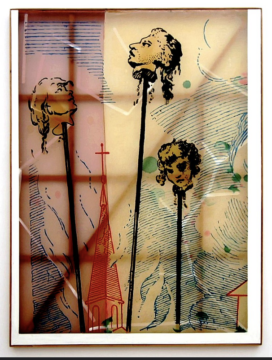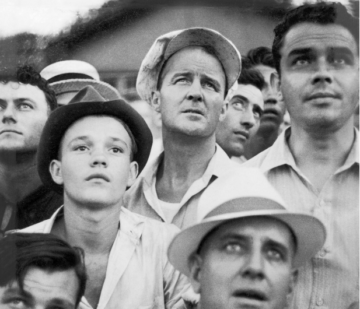by Rafaël Newman

There was an old man who so loved his son,
His day was only properly begun
Once he had hugged his darling to his breast
And kissed his tender cheek. Nor could he rest
At night until the boy was put to bed;
And still he’d stand by him, and stroke his head.
Or let’s just say: he liked him well enough,
Could bear his cries, and was not over-rough
When scolding him, begrudged him not his meat,
And saw that he had leather on his feet.
No, it was worse: in truth, he hated him,
Became a father on a drunken whim
And now was bound by duty, not by joy,
To spend his dotage tending to the boy.

The point is—love, or loathe, or suffer him,
That man prepared to carve him limb from limb
In answer to the urging of a voice
Within his head, which offered him a choice:
Prove your compliance with a sacrifice,
Or be excluded from my paradise.
It didn’t come to that, of course. The child
Was spared—not by his father, who was wild
To do the will of his delirium,
But by the very same mysterium
That had decreed the awful liturgy,
Which very act proved it a deity:
Inscrutable, contrarian, perverse—
A fitting ruler of the universe.
Which world we still inhabit to this day,
For all we pride us on our liberté,
On our égalité, and on a third
Enlightened creed, although the hoary word
Fraternité will need an overhaul
To serve new genders as a coverall;
Despite United Nations and World Health,
Increased longevity and share-the-wealth;
Though Yahweh’s been supplanted by AI
And our dominion’s broadened to the sky;
In spite of human rights, COVID vaccine,
The ICC and the Anthropocene:
Yet still we’re binding children to the block,
Subservient to some story from the stock
Of Master Narratives we’d thought out-told,
But which detain us in their noxious hold.
Of blood, belonging, birthright, name and nation,
Of capital and coin and corporation,
Of fancied claim and fabled colony,
Of manifest and latent destiny:
Such are the calls we answer, Deo laus—
Except those calls came from inside the house.

But that’s not all. This grand infanticide
Served in the name of madness deified
We relish with a side of bigotry
Unchallenged for its sheer hypocrisy:
Amid the slaughter of our adult young
And with a prophet’s tone and pious tongue
We interdict a mother’s choice to carry,
Make of her frame a human commissary—
A factory for live materiel
To wage our wars, equip our clientele;
An incubator of a guileless host
To fight for Father and the Holy Ghost.

And those among us who protest the loudest
Against a woman’s will are often proudest
When knotting nooses or when wiring chairs
To see a convict swiftly kicked downstairs
In fealty to their contradictive credo,
The sixth commandment meets retail libido:
We’ll kill them soon enough, the damned and cursed;
Just let them spend a little money first.

This ghastly pageant, our conscripting progeny
While legislating embryogeny
And slavering beneath the hangman’s drop
To catch the scent of death: it has to stop.
Let soldiers overturn tyrannical
War ministers; let puritanical
Defenders of the womb be banished thence;
Let gibbeters endure their own offense;
Let us no longer lend unquestioned credence
To fables of celestial intercedence;
Let fathers keep their offspring far from strife,
And mothers, should they wish to grant them life
In utero, those children cultivate
Whom they alone have chosen to gestate.
Let justice, which is not divine, be done,
And let the heavens fall: they serve no one.
